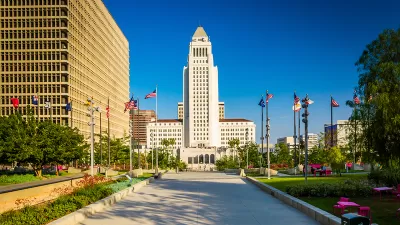The City of Los Angeles Department of Planning and Department of Transportation held a first-ever public online participation webinar Thursday, July 20, 2010. The city used the opportunity to experiment with web conferencing technology, and will survey participants after the event to evaluate the success of the experiment. A webinar is a web conference, where participants can access a virtual meeting using a computer, and Internet connection. Participants access a website to see the presenter's computer screen, and also listen to the presenter through the computer's speakers, or using a telephone.
The City of Los Angeles Department of Planning and Department of Transportation held a first-ever public online participation webinar Thursday, July 20, 2010. The city used the opportunity to experiment with web conferencing technology, and will survey participants after the event to evaluate the success of the experiment.
A webinar is a web conference, where participants can access a virtual meeting using a computer, and Internet connection. Participants access a website to see the presenter's computer screen, and also listen to the presenter through the computer's speakers, or using a telephone.
The webinar format allows interested participants to be involved from the comfort of their home, office, or even a coffee shop. In a city like Los Angeles – where traveling from the westside to downtown can take an hour – a web conference reduces the time investment required to participate in a meeting. Webinars (the word comes from combining the words "Web" and "seminar") have been popular for private businesses for several years, especially for providing education and training.
 The departments of Planning and Transportation hosted two back-to-back webinars to introduce the City of Los Angeles 2010 Bicycle Plan. The first webinar focused on an overview of the 2010 Bicycle Plan. The second webinar introduces the plan's five-year implementation strategy.
The departments of Planning and Transportation hosted two back-to-back webinars to introduce the City of Los Angeles 2010 Bicycle Plan. The first webinar focused on an overview of the 2010 Bicycle Plan. The second webinar introduces the plan's five-year implementation strategy.
The City of Los Angeles 2010 Bicycle Plan will serve as the city's blueprint for meeting the needs of all bicyclists and is intended to increase, improve and enhance bicycling in Los Angeles as a safe, healthy, and enjoyable means of transportation and recreation. The plan designates over 1,600 miles of bikeways and creates a blueprint for development of citywide and neighborhood bike networks. The two bicycle networks use designated city streets and bicycle paths to provide continuous bicycle access across the entire city. The five-year implementation strategy calls for creating 200 miles of bikeways every five years.
Each one-hour webinar included 30 minutes of presentation by Planning department staff, followed by 30-minutes of questions and answers. Questions were submitted by participants while registering for the webinar, or during the webinar by typing a question into the webinar software. The webinar software queues up all the questions for the presenters to review and answer.
 The bike plan public participation webinar was conceived by Ken Bernstein, AICP, who is adept at recognizing the value of applying technology to facilitate planning and public participation. Ken is Principal Planner in the City of Los Angeles Planning Department's Citywide Planning Division, and former director of preservation for the Los Angeles Conservancy. The project team and webinar presenters include Jordann Turner, Planning Associate; Jane Choi, Planning
The bike plan public participation webinar was conceived by Ken Bernstein, AICP, who is adept at recognizing the value of applying technology to facilitate planning and public participation. Ken is Principal Planner in the City of Los Angeles Planning Department's Citywide Planning Division, and former director of preservation for the Los Angeles Conservancy. The project team and webinar presenters include Jordann Turner, Planning Associate; Jane Choi, Planning
Assistant; Claire Bowin, City
Planner; and Michelle
Mowery, Senior Bikeways Coordinator.
Urban Insight, a Los Angeles-based technology consulting firm, is facilitating the experiment, and will be performing the evaluation of participants. (Disclaimers abound: I work for Urban Insight, I'm leading this project, and Planetizen is operated by Urban Insight.) The webinar was conducted using Citrix's GoToWebinar software.
More information about the City of Los Angeles 2010 Bicycle Plan: http://www.labikeplan.org/
More information about GoToWebinar: http://www.gotowebinar.com/
If you'd like to see the post-webinar evaluation, please send me an email ([email protected]).

Alabama: Trump Terminates Settlements for Black Communities Harmed By Raw Sewage
Trump deemed the landmark civil rights agreement “illegal DEI and environmental justice policy.”

Study: Maui’s Plan to Convert Vacation Rentals to Long-Term Housing Could Cause Nearly $1 Billion Economic Loss
The plan would reduce visitor accommodation by 25% resulting in 1,900 jobs lost.

Planetizen Federal Action Tracker
A weekly monitor of how Trump’s orders and actions are impacting planners and planning in America.

Waymo Gets Permission to Map SF’s Market Street
If allowed to operate on the traffic-restricted street, Waymo’s autonomous taxis would have a leg up over ride-hailing competitors — and counter the city’s efforts to grow bike and pedestrian on the thoroughfare.

Parklet Symposium Highlights the Success of Shared Spaces
Parklets got a boost during the Covid-19 pandemic, when the concept was translated to outdoor dining programs that offered restaurants a lifeline during the shutdown.

Federal Homelessness Agency Places Entire Staff on Leave
The U.S. Interagency Council on Homelessness is the only federal agency dedicated to preventing and ending homelessness.
Urban Design for Planners 1: Software Tools
This six-course series explores essential urban design concepts using open source software and equips planners with the tools they need to participate fully in the urban design process.
Planning for Universal Design
Learn the tools for implementing Universal Design in planning regulations.
Caltrans
Smith Gee Studio
Institute for Housing and Urban Development Studies (IHS)
City of Grandview
Harvard GSD Executive Education
Toledo-Lucas County Plan Commissions
Salt Lake City
NYU Wagner Graduate School of Public Service



























